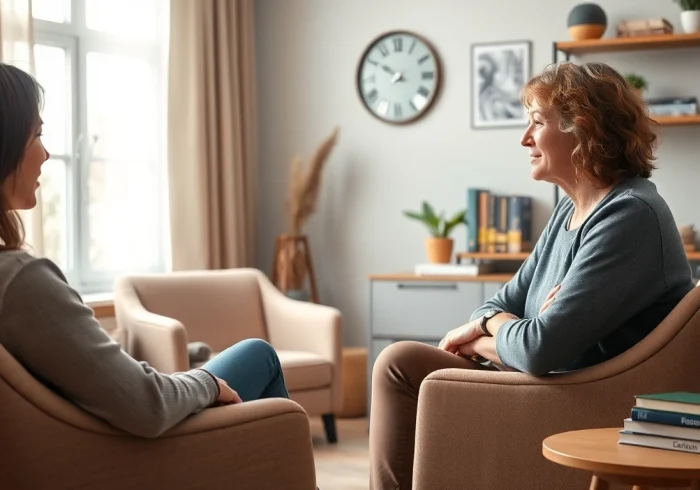Anxiety is a pervasive issue affecting millions of people worldwide, manifesting as a feeling of intense worry or fear. As we navigate the uncertainties of life, understanding dealing with anxiety becomes paramount for our mental health. This comprehensive guide explores anxiety’s nuances, coping mechanisms, professional support, self-care strategies, and the importance of a support system.
Understanding Anxiety
What is Anxiety?
Anxiety is a natural response to stress, often described as a feeling of unease or apprehension regarding an imminent event. While occasional anxiety is normal, chronic anxiety can lead to several disorders, such as Generalized Anxiety Disorder (GAD), Panic Disorder, or Social Anxiety Disorder. According to the National Institute of Mental Health (NIMH), anxiety disorders are among the most common mental health conditions, affecting a significant portion of adults in the U.S. alone.
Common Symptoms of Anxiety Disorders
Anxiety manifests differently in individuals, with symptoms ranging from mild to severe. Common symptoms include:
- Persistent worry or anxiety about various aspects of life.
- Physical symptoms such as increased heart rate, sweating, trembling, or muscle tension.
- Feeling restless, fatigued, or irritable.
- Difficulty concentrating or experiencing racing thoughts.
- Sleep disturbances, including insomnia or excessive sleeping.
These symptoms can significantly impair daily functioning, affecting personal relationships, work performance, and overall quality of life.
How Anxiety Affects Daily Life
Living with anxiety often leads to avoidance behaviors where individuals may shy away from situations that trigger their anxiety. This can result in missed opportunities—be it social engagements, career advancements, or personal milestones. A vicious cycle can emerge; the more one avoids certain situations, the stronger their anxiety becomes, further restricting their activities and interactions.
Coping Mechanisms for Dealing with Anxiety
Relaxation Techniques
Relaxation techniques play a crucial role in managing anxiety. These techniques help to calm the mind and reduce physiological symptoms associated with anxiety. Some effective methods include:
- Deep Breathing Exercises: Focusing on your breath can activate the body’s relaxation response. Inhale slowly through the nose for a count of five, hold for a count of five, and exhale through the mouth for a count of five.
- Progressive Muscle Relaxation: This involves tensing and then relaxing each muscle group in the body, helping you identify areas of tension and consciously release them.
- Visualization: Imagining a tranquil scene or visualizing a positive outcome can help shift your focus and ease anxiety.
- Yoga and Tai Chi: These practices combine physical movement with mindfulness, promoting relaxation and reducing anxiety symptoms.
Mindfulness Practices
Mindfulness involves staying present and fully engaging with the moment, which can reduce feelings of anxiety. Techniques include:
- Meditation: Regular meditation sessions can enhance self-awareness and help you observe your thoughts without judgment.
- Mindful Walking: Paying attention to the sensory experiences while walking can create a grounding effect, bringing your focus to the present.
- Gratitude Journaling: Writing about what you are thankful for can shift your perspective away from anxiety-inducing thoughts.
Physical Activities and Their Benefits
Physical exercise is a powerful tool for combating anxiety. Engaging in regular aerobic activities—such as running, swimming, or even a brisk walk—can release endorphins, improve mood, and reduce stress levels. Specifically, doctors recommend at least 150 minutes of moderate-intensity exercise weekly to alleviate symptoms of anxiety. Group sports or fitness classes can also provide social interaction, which can be beneficial for those struggling with social anxiety.
Professional Help for Anxiety
When to Seek Therapy
Recognizing the need for professional help is crucial in managing anxiety. Consider therapy if:
- The anxiety interferes with your daily life or responsibilities.
- Self-help techniques are not producing desired results.
- You experience intense physical symptoms, such as panic attacks.
- Your anxiety leads to depressive symptoms or suicidal thoughts.
Types of Therapy Available
Several therapeutic approaches can be effective in treating anxiety disorders:
- Cognitive Behavioral Therapy (CBT): CBT focuses on identifying and changing unhelpful thought patterns that contribute to anxiety.
- Exposure Therapy: Gradually exposing individuals to their fears can help decrease anxiety triggers over time.
- Dialectical Behavior Therapy (DBT): This combines cognitive-behavioral techniques with mindfulness practices, particularly useful for regulating emotions.
Medication Options
Medication can also play a significant role in treating anxiety. Common types include:
- Selective Serotonin Reuptake Inhibitors (SSRIs): Often prescribed as a first-line treatment for anxiety.
- Benzodiazepines: These can be effective for short-term relief but are less preferable due to the risk of dependency.
- Buspirone: An anti-anxiety medication that can mitigate symptoms without the sedative effects of benzodiazepines.
It’s important to consult with a healthcare professional to determine the best course of treatment tailored to individual needs.
Self-Care Strategies to Manage Anxiety
Establishing a Healthy Routine
A structured daily routine can significantly contribute to reducing anxiety levels. Consider the following elements:
- Consistent Sleep Schedule: Aim for 7-9 hours of uninterrupted sleep each night.
- Regular Meals: Eating balanced meals at regular intervals can stabilize blood sugar levels and mood.
- Limit Alcohol and Caffeine: Both substances can exacerbate anxiety symptoms, so moderation is key.
Nutritional Considerations for Mental Health
The relationship between diet and mental health is well-documented. Incorporate the following foods into your diet to support mental well-being:
- Omega-3 Fatty Acids: Found in fish, flaxseeds, and walnuts, these can enhance brain health and reduce anxiety symptoms.
- Antioxidant-Rich Foods: Fruits and vegetables, particularly berries, nuts, and leafy greens, can combat oxidative stress in the brain.
- Complex Carbohydrates: Foods like whole grains can increase serotonin production, leading to better mood regulation.
Sleep Hygiene Tips
Quality sleep is essential for managing anxiety. Implement these practices to improve sleep hygiene:
- Create a Relaxing Bedtime Routine: Spend the hour before bed engaging in calming activities, such as reading or taking a warm bath.
- Limit Screen Time: Reduce exposure to screens at least one hour before bedtime to improve the quality of sleep.
- Optimize Your Sleep Environment: Keep your bedroom dark, quiet, and cool to promote restful sleep.
Building a Support System
Communicating About Anxiety with Loved Ones
Opening up about anxiety can foster understanding and strengthen your support system. Here are some tips for effective communication:
- Share your experiences and feelings honestly to help loved ones understand what you’re going through.
- Encourage them to ask questions, which can help you clarify your experiences and needs.
- Reinforce that your anxiety is not a reflection of your relationships or their worth.
Finding Support Groups
Joining support groups provides a safe space to share experiences with others facing similar challenges. These groups can be found through local mental health organizations or online communities, offering resources, insights, and camaraderie.
Resources for Ongoing Help
To further assist in managing anxiety, consider the following resources:
- National Institute of Mental Health (NIMH): Comprehensive resources for understanding anxiety disorders.
- Mindfulness-Based Stress Reduction (MBSR): Programs that teach mindfulness practices to manage stress and anxiety.
- Therapist Directories: Websites such as Psychology Today allow you to find therapists specialized in treating anxiety disorders.
Conclusion
Managing anxiety is a multifaceted journey that often requires a combination of strategies, from relaxation techniques and professional help to self-care practices and a solid support system. By understanding anxiety, employing effective coping mechanisms, and seeking the right help, individuals can work toward living fuller, more peaceful lives. The path to a calmer mind is achievable—embracing each step is a move toward lasting change.



